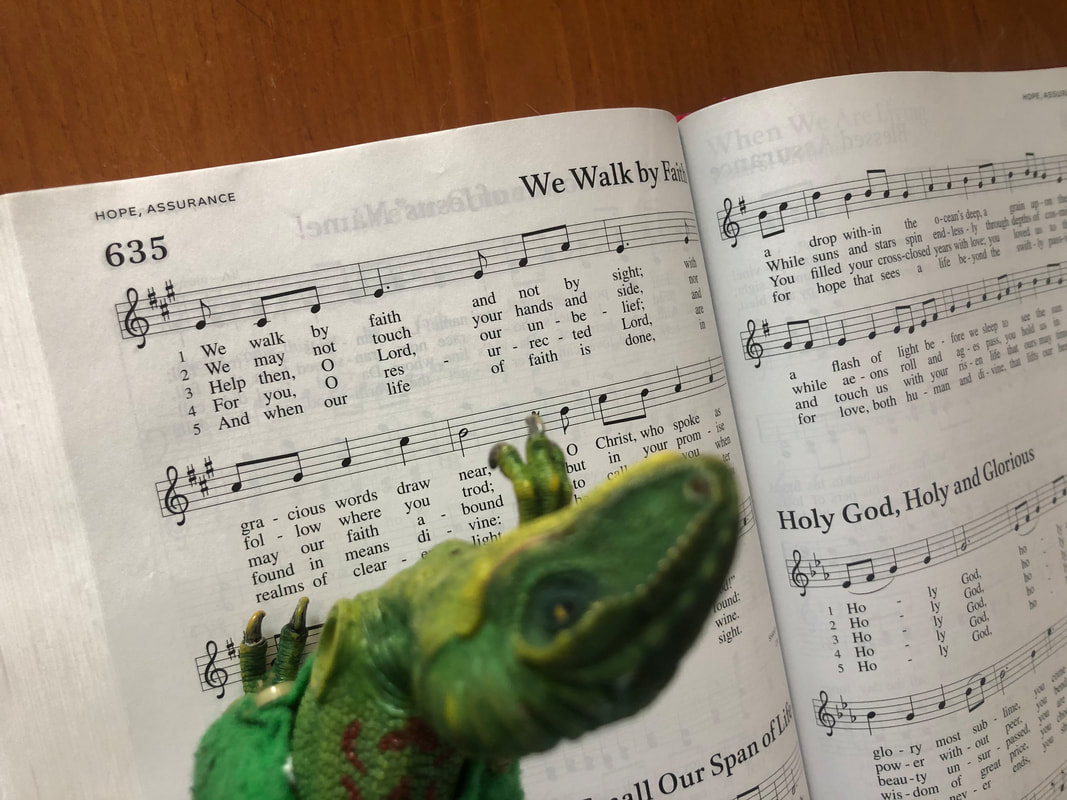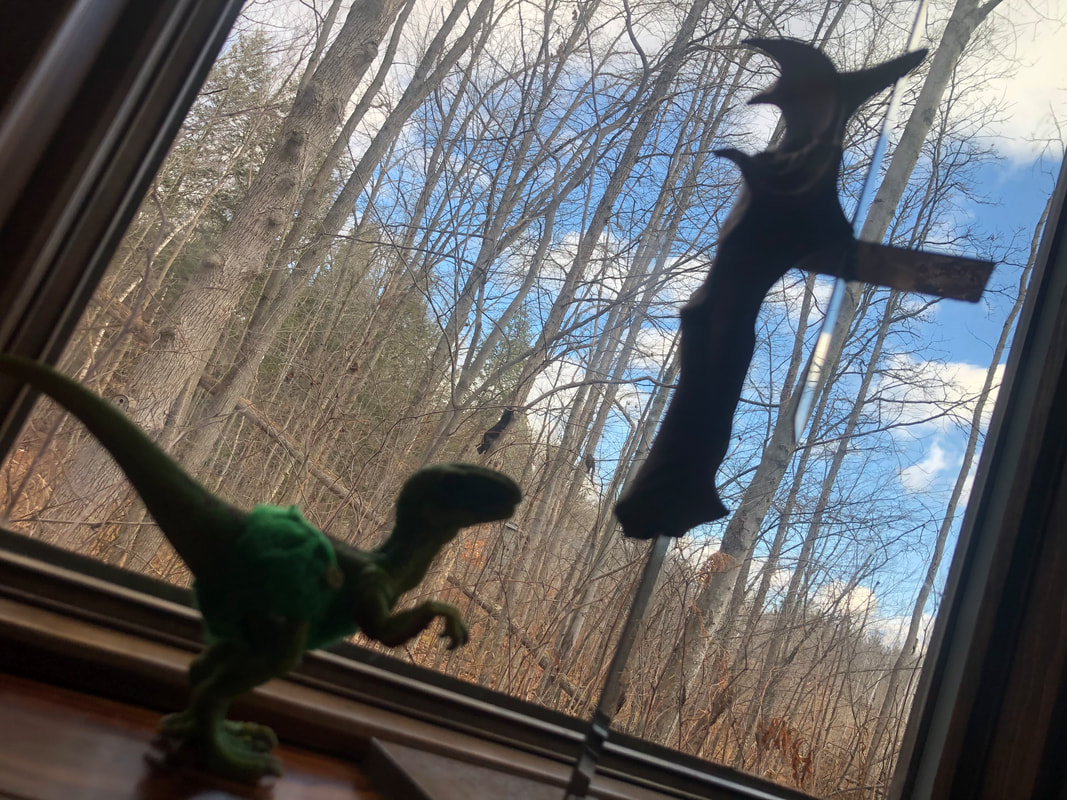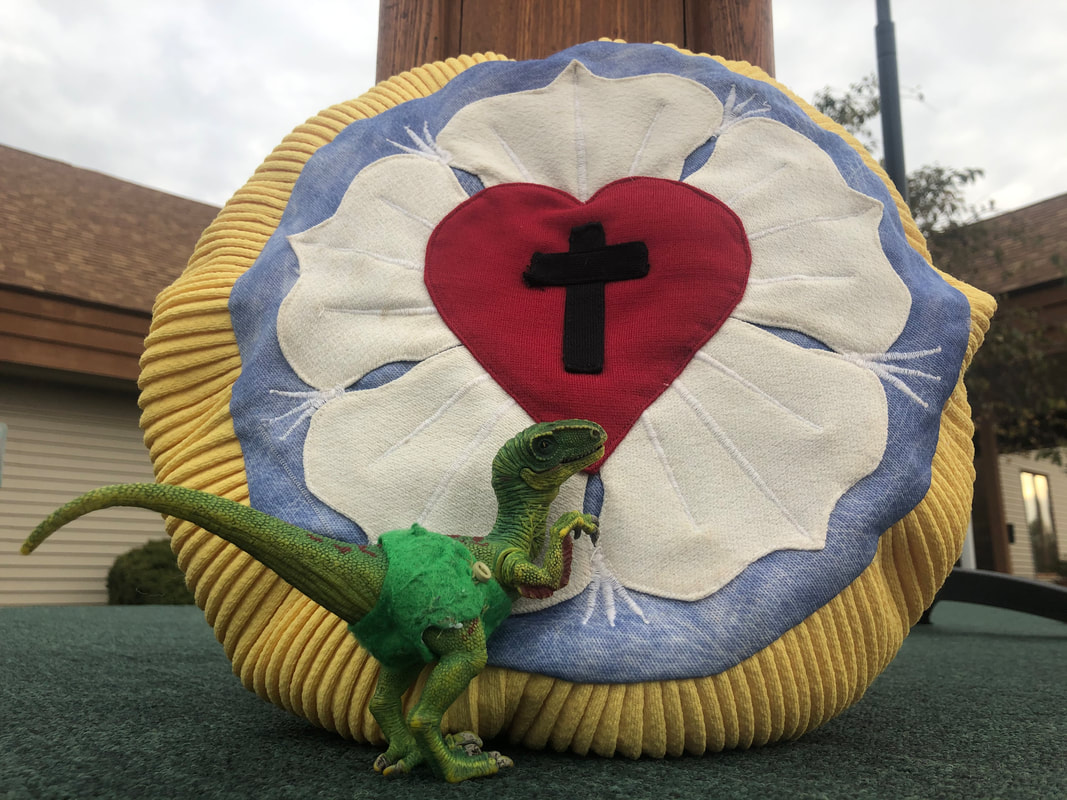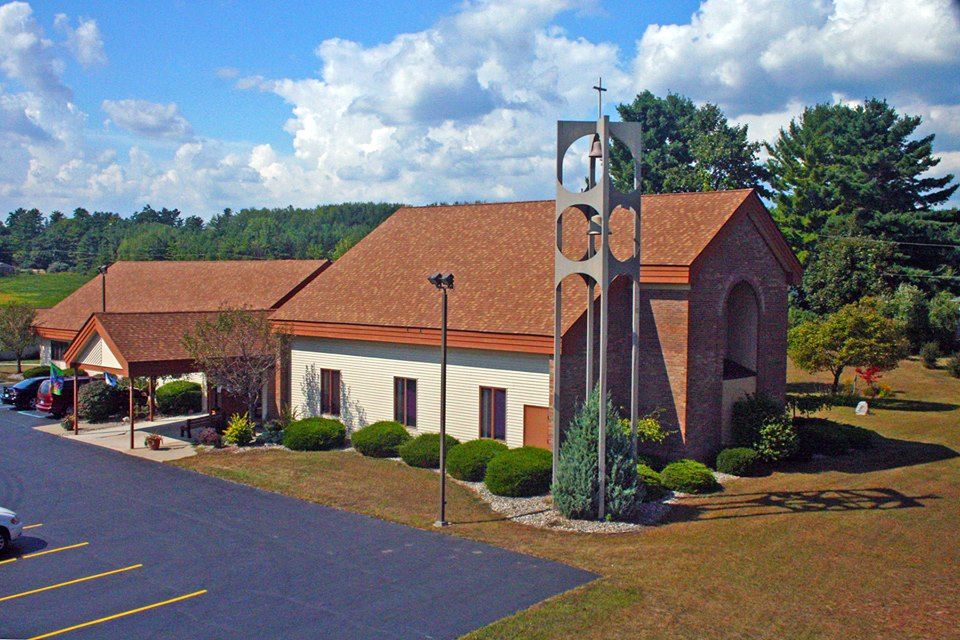|
Revelation 2:7 Let anyone who has an ear listen to what the Spirit is saying to the churches. To everyone who conquers, I will give permission to eat from the tree of life that is in the paradise of God. Classical Insight Unlike many of our other “clever words,” this one is actually quite common in Classical Greek! In fact, νικάω (nikaō) is a verb that students often encounter early on in their Greek studies, in part because it provides an example of a distinct pattern of conjugation (but we don’t need to worry about that here). Its familiarity is probably due, in part, to its broad usage -- it can describe victories in battle, athletic contexts, law courts, and arguments, and might often be better translated as “to prevail.” Devotion Wondrous things are promised to the churches that conquer or win νικάω: the morning star, manna, fruit from the tree of life, white robes, among other things. But how does the church go about winning? If we look to Jesus, victory does not involve fierce battles and daring deeds, but the cross. A Christian is victorious not through winning but through losing. Not necessarily heroic losing either. Song, story, and cinema glorify the idea of a last stand. The hero dies in a fiery battle, resolving the problem through bloodshed, his enemies’ and his own. But if the cross shows us anything, it is that we are not the heroes in this story. Jesus is the savior and we are the saved, freed to lose because victory is not up to us. What if apostasy protects a loved one? What if denying Christ means we get to live and witness another day? What if lying about our belief shelters the vulnerable? And what if at the end of all of this apostasy and denial and lying we turn to Christ, trusting in his mercy for a messy world? It may not be heroic, it may not get us a halo or stained glass window, but it does proclaim Jesus, and Jesus wins in the end. Questions for Reflection When have you experienced failure as a Christian? How have you encountered Jesus in failure?
1 Comment
Verse
Revelation 2:19 “I know your works—your love, faith, service, and patient endurance. I know that your last works are greater than the first. Classical Insight In Euripides’ Electra, the chorus expresses its “small” or “little faith” (πίστιν σμικρὰν, pistin smikran) in a story about the actions of the god Zeus (lines 726-736). This Greek word, pistis, is a pretty good match for the English word “faith,” with its range of both religious and secular connotations. We, too, speak of having “little faith.” Yet how do we really envision degrees or magnitudes of faith? How might we measure it? Is “faith” or pistis an either/or proposition (you have it, or you don’t), or can you have a bit of faith -- and what would that mean? Devotion When we have said the Lord’s Prayer during parking lot church, I have invited people to place their hands on their car windows as a gesture of faith, Πίστις. Even though we cannot hold one another right now, it will not always be so. Faith is not an easy thing to keep. Many of the churches addressed in the first few chapters of Revelation are starting to weaken in their faith keeping. Continuing to live out their faith in Jesus in a hostile environment day after day is exhausting. It is no wonder that John repeatedly urges them to repent and reorient their lives and priorities. We too grow weary. We ache for normalcy, for the simplicity of a Sunday morning of singing, sharing the Lord’s Supper, and holding hands as we say the Lord’s Prayer. These practices do so much to keep us strong in the faith and without them it can feel like that faith is slipping away. Thankfully, while we are disciples in the faith, Jesus is a master. In the life, death, and resurrection of Christ we see just how faithful God can be to God’s people. When we stumble and grow weary, when we give up and let our faith drop to the ground, God keeps holding on. God is faithful and will keep that faith and keep us too. Questions for Reflection What faith practices have helped you keep the faith over the past few months? Who is an example of faithfulness in your life? Revelation 2:9
“I know your affliction and your poverty, even though you are rich. Classical Insight Θλῖψις (thlipsis, say that three times fast) is not a common word in Greek literature. It shows up in medical writing as a term for physical pressure, before it is used to describe metaphorical “pressures,” or “oppressions.” In a treatise linked to the philosopher Aristotle and his school (the “Problems”), for example, the author explains how the application of “pressure” (θλῖψις) causes bruising and swelling. Devotion Discomfort. Inconvenience. Awkwardness. We try to minimize these feelings as a church. We want all who join our community to feel at ease and welcome. But, as of late, we have all been struggling under an unrelenting pressure: masks are uncomfortable; maintaining social distance is inconvenient; enforcing new rules is awkward. We see other faith communities making different decisions and wonder if we’re getting it right. Welcome to the reality of living in a time of persecution, or what John calls Θλῖψις, thlipsis. Now, let’s not leap to the more gory stories of martyrdom. For many if not most of the Christians receiving John’s letter, the concern was less about being tossed to the lions tomorrow and more about the daily grind of hardship and uncertainty. To follow Jesus meant to refuse to participate in the worship of other gods. As a result, the early Christians were outsiders in their own culture where worship of the Roman emperor and other deities was part of doing business. Christians suffered economically and socially, while living under the real threat of being brought to trial for their faith. Day after day they had to deal with unrelenting pressure, discomfort, and anxiety; Θλῖψις. For John, however, Θλῖψις is not just hardship but also an opportunity to witness to the gospel. Patient endurance under daily discomfort and pressure, proclaims the gospel, then and now as well. Questions for Reflection How have you experienced the good news or proclaimed it during this time of unrelenting pressure? Revelation 2:5a:
Remember then from what you have fallen; repent, and do the works you did at first. If not, I will come to you and remove your lampstand from its place, unless you repent. Classical Insight The verb μετανοέω (metanoeō) is composed of two parts: the prepositional prefix meta (with, after) and the verb noeō (to perceive, think). It thus underscores the way that “changing one’s mind” is an act of “rethinking” or “thinking again.” Socrates, in Plato’s dialogue Euthydemus (279c), remarks that he has “changed his mind (metanoeō) once more (au) again (palin),” piling up adverbs that further stress an ongoing process of reconsideration, rethinking, and reassessing. Devotion “When were you saved, Pastor?” I have known Christians who have the specific date of when they were saved: a moment when they confessed their sins and accepted Jesus into their hearts. I suppose I could say that I was saved early in January of 1987 when my family had me baptized, or I could say I was saved last night when I took a long hard look at my growing list of resentments and hurts and asked God to forgive my selfish self and remind me how to love (again). John calls repeatedly for the churches to repent, μετανοέω: to change their hearts and reorient their lives toward Jesus. But let’s remember, this isn’t the first time the members of these churches experienced a change of heart. When they first heard the gospel and accepted Jesus as Lord, their hearts were changed and they experienced repentance and salvation. And yet, John sees them in their struggles and urges them to repent once again. What John’s repeated calls for repentance show us is that God is constantly breaking into our hearts and reorienting our lives. Salvation is an ongoing process and repentance is best learned through repetition. Questions for reflection When have you had to practice repentance over the last several months? Revelation 2:4 But I have this against you, that you have abandoned the love you had at first.
Classical Use Compared to other Greek words for love (philia, erōs), agapē doesn’t show up much in Classical Greek literature - it is very much a word that becomes prominent in the New Testament. Yet its earlier uses imply a mix of affection, devotion, and action comparable to what we see in Christian texts. In Euripides’ play The Suppliants, for example, a messenger (angelos!) describes how the Athenian king Theseus “tends lovingly” (agapaō, verbal form of agapē) for those who have died in battle (line 764). Devotion It has been a hard year for love of all varieties. Dating in the era of COVID-19 is even more awkward and complicated than before. We are unable to express love for friends and family in the usual ways. Add to that, in this season of isolation, frustration, and strong feelings about what is right, wrong, and essential, it is hard to remember that we love each other at all. For the Christians addressed in Revelation and us as well, love is at the heart of what it means to follow Jesus. In Jesus we experience a love that transforms. This love, agape, is more than a feeling of warmth or fondness. It is demonstrated not just through emotion, but in the active care for one another. Care that is demonstrated when we do things like forgo family gatherings to keep those who are vulnerable safe, wear masks because we want to make our community safe for everyone, and speak up for justice so that everyone is able to live and love one another in peace. For Christians, love is expressed through actions. And sure, when we are tired and discouraged it is easy to forget that sort of love. But even when we are unlovable and unloving we remain beloved to God. Consider yourself reminded; you are loved and you are capable of loving others. Questions For Reflection How have you practiced love in the past few weeks? When has someone shown love to you? Revelation 22:16
“It is I, Jesus, who sent my angel to you with this testimony for the churches. I am the root and the descendant of David, the bright morning star.” Classical Insight The word ἄγγελος (angelos) means “messenger” in Greek, before it comes to mean “angel” in the sense of a semi-divine/non-human messenger of God. Messengers (angeloi) are stock characters in Greek tragedy, where they generally report the dramatic, grisly, and often upsetting events that have occurred “offstage.” They thus play a crucial dramatic role, despite the fact that they often go unnamed and possess very little power or authority within the world of the play itself. The messenger of Sophocles’ Antigone is a particularly interesting case: he’s a somewhat comic figure, marked by cowardice and indecision, yet occasionally capable of manipulating and redirecting the powerful tyrant Creon. He’s no “angel” in the Christian sense, yet he’s an important and complex figure who speaks words of great significance. Devotion A messenger can be good or bad, the bearer of glad tidings or horrific tragedy. In scripture, messengers can be human, such as John the Baptist (Matt. 11:10), or supernatural such as the angels of the seven churches in Revelation. Regardless of whether they have wings or not, messengers carry information from one setting into another. In Revelation 2 and 3, the angels of the churches receive information from the Lord to communicate to their respective earthly communities. Messengers, earthly or otherwise, exist because we cannot be everywhere at once or know everything as it happens. When it comes to Revelation, that is especially true. The churches know that they are struggling, but not the full reason why. In Revelation John informs them that their struggles have underlying causes that are not of this world. The turmoil of the heavens is felt through human suffering. Perhaps our holiday tendency to decorate our homes with sparkling angels bearing sweet smiles and beautiful wings is a reflection of our own limitations. There is more to this world than we know. Unforseen events occurring “offstage” impact our lives in unexpected ways. Even so, angels give us hints of hope and words of encouragement. We don’t need to know everything to persist in following Jesus. Questions for Reflection When have you been an angel: communicating new information to an individual or group? What was it like? Was the news good or bad? What about the experience sticks out for you?  Revelation 2: 1-2 “To the angel of the church in Ephesus write: These are the words of him who holds the seven stars in his right hand, who walks among the seven golden lampstands: “I know your works, your toil and your patient endurance. I know that you cannot tolerate evildoers; you have tested those who claim to be apostles but are not, and have found them to be false. 3 I also know that you are enduring patiently and bearing up for the sake of my name, and that you have not grown weary. Classical Insight: In earlier Greek literature, we sometimes find this word (in its verbal form, ὑπομένω / hupomenō) in martial contexts, meaning to “stand one’s ground, to stand firm.” In the Iliad, for example, the poet describes how the “Argives (= the Greeks) stood firm, all together, and were not afraid” (Ἀργεῖοι δ᾽ ὑπέμειναν ἀολλέες οὐδὲ φόβηθεν, Homer, Iliad 5.498). Devotion: Seeing as ὑπομονή shows up both in Revelation, a book where war breaks out in heaven and on earth and makes an appearance in the Iliad where war breaks out in heaven and on earth, one would expect the early church to be more warlike. The prophet John commends the church of Ephesus for its ὑπομονή, its patient endurance, the fact that these Christians are standing their ground. But what does that mean? Certainly, none of these churches are handing out swords and going to war. Whatever conflicts rage in the heavens, for the Christians addressed in Revelation, standing their ground meant, as my beloved Oma used to say “putting one foot in front of the other.” They are to continue following Jesus even when such discipleship is inconvenient or dangerous. For the churches named in Revelation, persecution could be anything from trial, to prison, to economic hardship, and cultural isolation. All these things must be endured and in being endured, the gospel of a God who also endures hardship in Christ Jesus is proclaimed. To endure, to get up day after day and put on Christ for one another, is how we follow Jesus, then and now. Questions: What are examples of patient endurance from your own life? How can the church practice patient endurance in such times as these? |
About the Blog
Journey through the season of Advent with daily updates on the adventures of St. Mark's Lutheran Church in Belliacre, MI as they attempt to cobble together a Christmas Pageant with an unlikely cast of characters. AuthorsAmelia Corbett Illustrator
Stephanie Dubbs
Stephanie is an art educator and a landscape/portrait artist. Her inspirations come from the amazing people she meets and the gorgeous state of Michigan as well as her home state of Florida. She and he husband love nature. They are out in the water during the summer months and on the snow in the winter enjoying the simple pleasures of life. Archives
December 2021
Categories |

A church of the
Evangelical Lutheran Church in America |
Like us on Facebook.
|
Christ the King Lutheran Church
600 S. M 18 Gladwin, Mi. 48624 989-426-1659 Pastor Emily Olsen [email protected] |
|
Email [email protected] for correction or to have information included on this web page








 RSS Feed
RSS Feed
